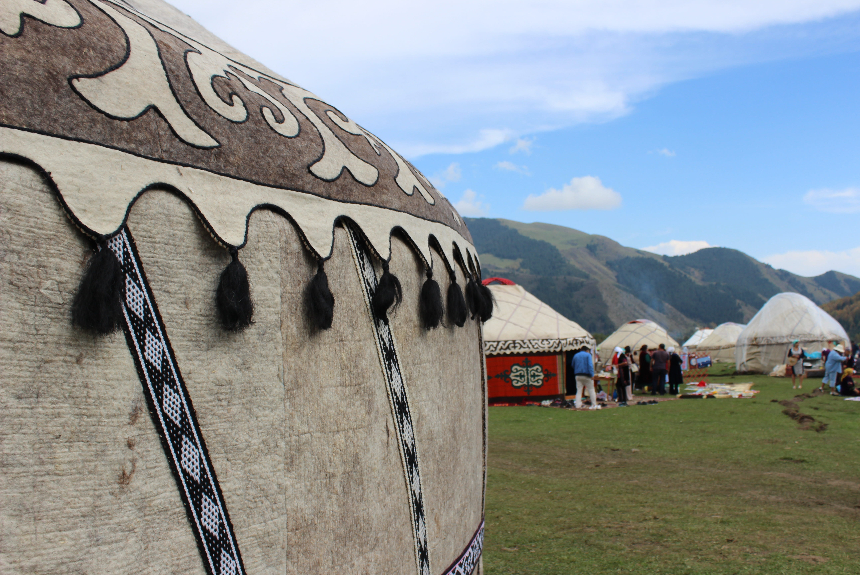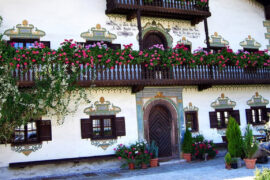How are migrants, refugees, immigrants, Modern-Day Nomads, and Expats similar and different from each other? Why are both Expats and Modern Day Nomads included in the Fifty Plus Nomad community? How are Modern Day Nomads and Expats different from other migrants and refugees?

“When a man is denied the right to live the life he believes in, he has no choice but to become an outlaw.”
Nelson Mandela

Modern-Day Nomads and Expats Versus Traditional Migrants and Immigrants
Definitions of Migrants and Nomads
I started this website to create a community of people who want to live a similar lifestyle to mine.
I have spent 16 years traveling worldwide and living outside the US. I have visited more than 85 countries and lived for over a year in 4 countries. I speak pretty fluently in four languages, and when I am not traveling, I dream of my next trip.
During my sixteen years, I have met hundreds of people who seem to have a similar lifestyle or dream of living as I do. But, they seldom had much in common except a yearning to see the world for more than just a couple of weeks a year.
However, I think the yearning to see the world and live abroad is enough to make us into a community. For this reason I developed the name Fifty Plus nomad and put together this website in 2019.
I had a difficult time coming up with a name for this community. I wanted to reach expats and modern-day nomads over 50, primarily from the US and Canada, with an open mind and an active sense of curiosity.
When I asked other potential community members what to call the community, the conversation quickly focused on why people leave their homes for extended periods. We decided that we were not migrants because we typically didn’t leave our homes for primarily economic reasons.
I also asked the other members of my new community how Fifty Plus Nomads are different from other types of modern-day nomads (like vanlifers, snowbirds, backpackers, digital nomads, and RVs) and expats.
We decided that all these groups are similar but are only small parts of the potential Fifty Plus Nomad community. Many of us move back in forth between these different lifestyles depending on our needs and desires.
I discovered that most of us had never thought to calling ourselves or even understood the definitions of different Migrant and Nomad groups. So, I developed this post to provide Fifty with Plus Nomads a basic primer about all these other communities.


Different Types Of Migrants
There are four types of migrants: Three are well-known and oft-discussed: immigrants, migrants, and refugees. The fourth type of migrants -expats- are lesser-known and relatively new parts of the migrant community.
Definition of Immigrants Vs. Migrants
Nowadays, the world has millions of migrants and immigrants.
Migrants move somewhere outside their home (usually in the same country), and immigrants move to another country.
Immigrants usually:
- Do not intend to return to their home country.
- Leave their homes primarily to find some opportunities (typically economic) that do not exist at home. (Many immigrants also move to another country to live with their family or spouse).

What are Refugees?
Refugees escape their homes because of war, famine, or natural disasters. (Officially, asylum seekers are in a country before receiving official permission to live there yet).
Unlike refugees, most immigrants can survive if they stay at home; however, they do not have much choice but to leave home if they want a better life.

Regardless Most of These Migrants Would Rather Stay Home, if Possible
Like most people globally, immigrants and refugees would be happy to stay at home for most of their lives as long as they had sufficient economic opportunities and stability.
Most people with adequate opportunities at home feel lucky to leave their homes a couple of times a year for a week or two to go on a vacation. But, they usually leave their vacation refreshed and ready to return home. For these people, vacationing offers a chance to relax, change pace, or even a learning opportunity.

What is an Expat?
The definition of expatriate (or expat) is somewhat muddled. Officially, expats live in another country for several years after leaving their home country for primarily quality of life (non-economic) reasons.
The term expat comes from the 19th century and originally signified rich people who spent significant periods of their lives in sunnier, more cultured climes like Tuscany in Italy or Provence in France).
Most media assume that expats will live in another country full-time for several years. While this is true for many expats, it is not valid for many others. As often as not, many expats live in ways that resemble Nomads.



What is a Nomad?
Until around 5000 years ago, most people were nomads. We traveled from place to place to find animals, water, and materials to build a shelter. Then, we settled into one place to develop agriculture, cities, and trades. Until the 19th century, most people seldom traveled more than twenty miles from their homes in their entire lives. Traditional nomads are rare outside of rural Africa and Latin America today.

Most Modern-Day Nomads Today Are Backpackers, Digital Nomads, and Vanlifers
While traditional nomads still exist, most nomads travel worldwide for extended periods today for adventure and learning. These modern-day nomads are called either Backpackers, Digital Nomads, or Vanlifers. (Like our ancestors, we do not set down roots in one place for a long time, and we don’t have to be nomads). Unlike previous nomads, they do not have to leave their homes; instead, they choose to leave.
Many younger nomads are Backpackers or Digital Nomads. As their name implies, Backpackers usually travel with a stereotypically bulging pack on their back on a modest budget. (Typically $50 to $100 a day for all expenses). Many Backpackers travel between many of the same places, and they rarely spend more than a couple of days in one place. Backpackers visit tourist communities that typically offer a lot to see and have restaurants, activities (including partying), and lodging well-suited to the backpackers’ needs. (Nomadic Matt is an excellent source of information for backpackers).
Digital Nomads are another significant and growing segment of mostly younger Nomads. Digital Nomads usually make their living in freelance, computer-related work that does not require them to be attached to one place, and many others make their living in drop-shipping.
Increasingly, Digital Nomads and Backpackers stay in the same places as other members of their tribe. However, unlike Backpackers, Digital Nomads spend weeks or months in one place and often work together. Digital Nomads also can’t stay anyplace for very long without high-speed computer connections and workspaces. (Johnny FD provides an extensive discussion of the Digital Nomad lifestyle)
Another significant and growing segment of Nomads of all ages is Vanlifers. Vanlifers, as their name implies, live, and travel in their vans. Until recently, most vanlifers travel around the world. However, as the recent movie, Nomadland demonstrated, vanlife is becoming a common way for displaced workers in developed countries to survive on less money.
Most other Vanlifers travel to several countries by van (sometimes in a caravan with other vanlifers), usually with the same continent. Some even ship their vans between continents and travel worldwide for years at a time.

The Main Common Characteristics of the Modern Day Nomad and Expat Communities
When I began this website, I spent a lot of time creating a definition for a Fifty Plus Nomad and deciding who is part of the community. As I began to think about this issue, I realized that the nomadic and expat communities share more similarities than differences. I also noticed that many people like Vicki Skinner and myself move back and forth between places and the nomad and expat lifestyles.
As I thought about it in detail, I realized that expats and Modern Day Nomads have one defining characteristic: itchy feet.
Modern-Day Nomads and Expats Have Itchy Feet
Society accuses both modern-day nomads and expats of having itchy feet. Some people, myself included, don’t find vacations enough. We want to spend considerable parts of our life discovering new places, people, experiences, and lifestyles.
People with itchy feet spend months and sometimes years traveling from place to place in search of a more fulfilling life or moving to another country for a better quality of life. We get bored with living at home, and some of us may not feel at home in our native lands.
The desire to travel or move for a long time is relatively rare, and it has only been possible for all but the rich since WWII.
We are privileged people who have already established a reasonably prosperous and stable lifestyle at home but want to move around to become more self-actualized.
Many people view those of us with itchy feet suspiciously. They think we are escaping something or that we have something to hide. They may accept that we are moving for a practical reason, like spending less money, but they are suspicious of the intangible reasons behind our nomadic ways. (See my post on Justifying Long Term Travel).

What Is a Fifty Plus Nomad?
A Fifty Plus Nomad is anyone over50 who has itchy feet and wants to travel or live abroad either part-time or full-time. We dedicate part of our lives to making travel and life abroad an integral part of our lives.
Since we are over 50, many, if not most, of us are either retired or planning to retire soon.
While often not the case, most Fifty Plus Nomads usually have some savings and want to live and travel in some comfort. Most of us are not comfortable in lodgings (often hostels and modest guesthouses) where most backpackers stay. (Though I have met many Fifty Plus Nomads in backpacker hangouts).
Since many Fifty Plus Nomads don’t have to work and have many years to explore the world, many of us often settle down in one or more places for an extended time.
Fifty Plus Nomads come in many different guises. I have met Fifty Plus Nomads who live on cruise ships and others who spend most of the year on different group tours. However, most Fifty Plus Nomads I have encountered travel or live abroad independently.
Since most backpackers and digital nomads are younger than us (and usually on tighter budgets), Fifty Plus Nomads are similar to two nomadic travel-related communities: RVers and sunbirds.
The largest and most established community of Fifty Plus Nomads is the one million Americans and Canadians RVers (Recreational Vehicles). Most nomads live in their RVs while traveling primarily within the US and Canada (and sometimes Mexico).
The second sizeable Fifty Plus Nomad travel community is snowbirds. Snowbirds move from Canada and the Northern part of the US to Arizona, Florida, Hawaii, California, and Mexico for a few months every year. Snowbirds go back and forth primarily to escape winter’s cold at home.
Note: I have another post that defines Fifty Plus Nomads in more detail.

Why Are Expats Part of the Fifty Plus Nomad Community?
I struggled with whether my website should include expats for a long time.
Modern-Day Nomads over the age of fifty fit into my website. Nomads in most peoples’ minds infer people who move frequently. Indeed, anyone who travels for a long time is a nomad, even if they only travel domestically.
But do expats belong with Fifty Plus Nomads? The answer is complicated. Ultimately, I would say they do for the following reasons:



Expats Aren’t Like Immigrants or Refugees
Both expats and Fifty Plus Nomads are distinct from immigrants and refugees because we:
- Don’t need to move to have a better economic situation or a more stable life; and
- Probably won’t settle down in one place for the rest of our lives.
Economic motivations play a role (though seldom the principal) in expats’ and Fifty Plus-Nomad’s decisions to hit the road. Many people over 50 become nomads or live abroad partly because it is cheaper than staying at home.
We also hit the road to save money. Many countries have a significantly lower cost of living than the US or Canada.
Yet, even though many websites advertise the benefits of living and traveling in cheap countries, I haven’t met that many Fifty Plus Nomads who hit the road exclusively for that reason.
However, I have met many Fifty Plus Nomads who seek the best of both worlds. A more intellectually and emotionally satisfying life is also less expensive than home.

Like Modern Day Nomads, Many Expats Don’t Settle Down In One Place.
Most people assume that expats will settle into one place and stay there for many years.
Some expats also travel a lot. Many expats, like Modern-Day Nomads, frequently move to search for new places and adventures. Yet, few realize that many, if not most expats like me, will not fit into this pattern.
Here are some examples of expats that do not move to another country and stay there for years. Specifically, these expats live:
- In more than one place outside their home country during the same year;
- Part of the year in their home country and then several months in another country;
- In one place outside their home country for a couple of years and then move to another place abroad;
- In one country for several months a year and travel for the rest of the year; and
- In one place abroad after traveling, living, or working worldwide for many years. (More often than not, these expats find it easier to settle outside their home country).
We Fifty Plus Nomads often create our own mix of nomadic and expat lifestyles. I call us peripatetic nomads. We go back and forth between being Modern-Day Nomads, expats, and sometimes even returning to our home country. When we are in one place for a long time, we keep the idea of moving or traveling again in our minds. After a while, this peripatetic lifestyle becomes addictive and regular.
Expats who do not just settle into one place are hard to define. Sometimes expats, particularly if they want to live in Europe, the US, Canada, Australia, and New Zealand, can’t get the legal right to stay in their newly chosen country year-round. They decide to live part of the year abroad and the other part at home (or even in a third country).
Some expats go back and forth to their home country for family, health, or work-related issues. Often, expats decide to settle down in one place for a while to recharge their batteries, see family and plan their next adventure after spending months on the road traveling.

I Am Both an Expat and a Modern Day Nomad
Like many other people who live abroad, I have been an expat and a Nomad.
I have spent nearly sixteen years of my life traveling, living, studying, volunteering, or working outside California. Until April 2004, I spent most of my time at a home base, though I spent almost three years traveling, living, studying, and volunteering outside of these homes. Even when I was not on the road, hardly a day passed when I wasn’t thinking or planning my next adventure. I always had and always will have itchy feet.
In 2004, I started to live a more nomadic lifestyle. From 2006 to 2009, I spent, on average, three months a year traveling to research classes about living and traveling abroad. Then, I spent three to five months a year traveling around the US, giving these classes.
From April 2011 until I bought my house in Merida in November 2015, I traveled for nine months (aka a Modern-Day Nomad) and lived in Montreal consistently for three to four months a year. (I am not from Montreal. I had never even visited the City until 2011, when I started to live there part-time),
After buying my house in Merida from November 2015 until March 2020, I spent between three and five months a year traveling. I spent the rest of the time in Montreal (two to four months a year) and Merida (three to seven months a year).
Since March 2020, I have been a full-time expat in Merida. I intend to keep spending most of my time in Merida until my Fifty Plus Nomad business either allows me to pay for traveling again or requires me to travel to market and teach seminars in the US and Canada.
I am no longer a Modern-Day Nomad, but I continue to share many characteristics with Modern-Day Nomads because I:
- Don’t intend to live in Merida full time for many years and take a couple of weeks vacation a year to recharge my batteries;
- Have itchy feet and plan to return to traveling for extended periods (at least part-time) as soon as possible;
- Am helping others with itchy feet find out how to live as Fifty Plus Nomads; and
- Try to learn more about my newly adopted (at least temporarily) homeland, Mexico, and Merida.

Dreaming of Becoming an Expat or Modern Day Nomad Makes Someone a Fifty Plus Nomad
Dreaming or contemplating a nomadic lifestyle makes you part of the Fifty Plus Nomad community. Most people will never think about living or traveling abroad for an extended period and are tied to their homes. Ultimately, anyone over 50 who shares a travel itch could be a part of our community.
I would guess that around 20% of Americans and Canadians dream of becoming Fifty Plus Nomads. Yet, only about 1-2% do it. Why? Mostly out of fear or the belief that it is not possible.
I want to encourage people to take up the dream. Therefore, I’ve designed Fifty Plus Nomads to give people nomadic plans, space, time, and even permission to think about this dream.
Yet, I also cover the realities of a nomadic lifestyle- good and bad- so that dreamers can decide if this lifestyle is right for them. (I would guess that around 20% of the people with the dream are probably not meant to be nomads in reality).
Do you want to know if you have what it takes to be a Fifty-Plus Nomad? Take my quiz (upcoming).

Fifty Plus Nomad offers personalized workshops and courses in Spanish, English, Living and Traveling in Mexico, and Long-Term Travel Book a Two-hour Free Sample Introductory Session

Want to Explore These Issues Further?
- Find out more about the definitions of migrant, immigrant, refugee, and asylum seekers.
- Learn more about Americans Living Overseas.
- Discover more about the official definition of the difference between expats and migrants.
- Read my profile of Vicki Skinner, an expat, and nomad who lives on limited funds.
- In 2021, the movie Nomadland portrayed the joys and trials of Vanlifers in the US.






















